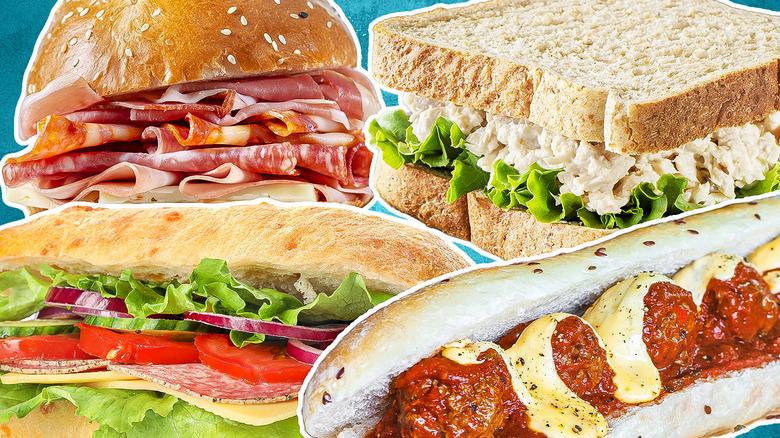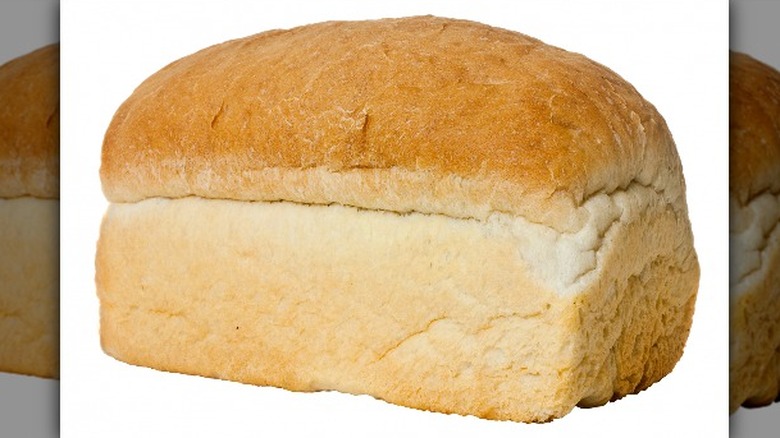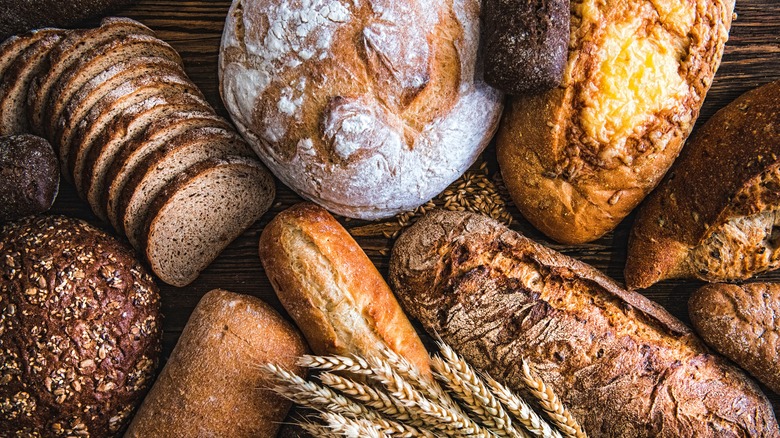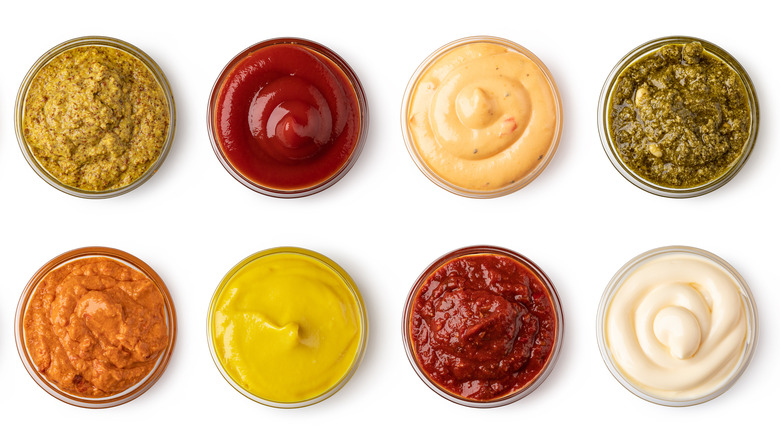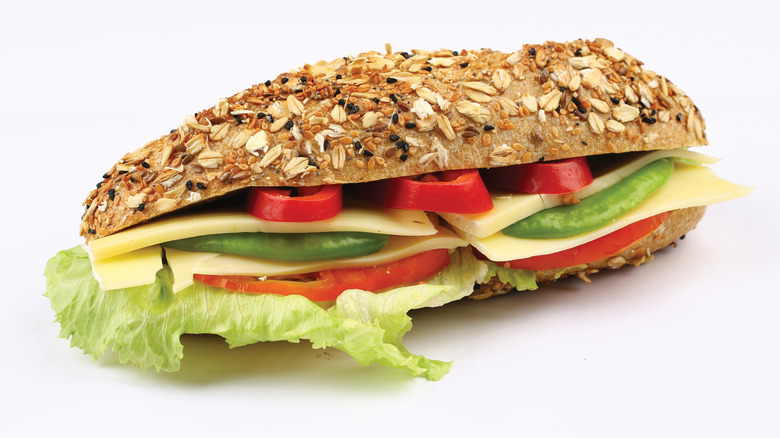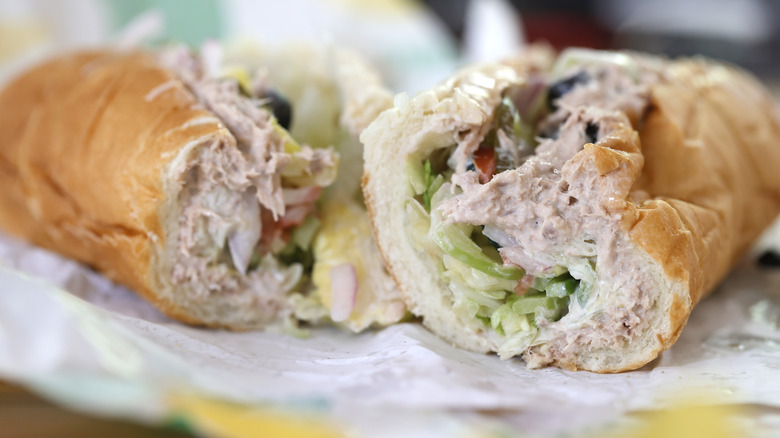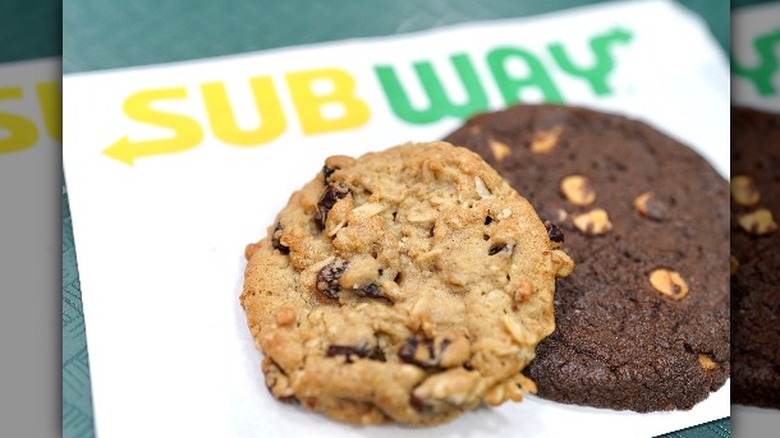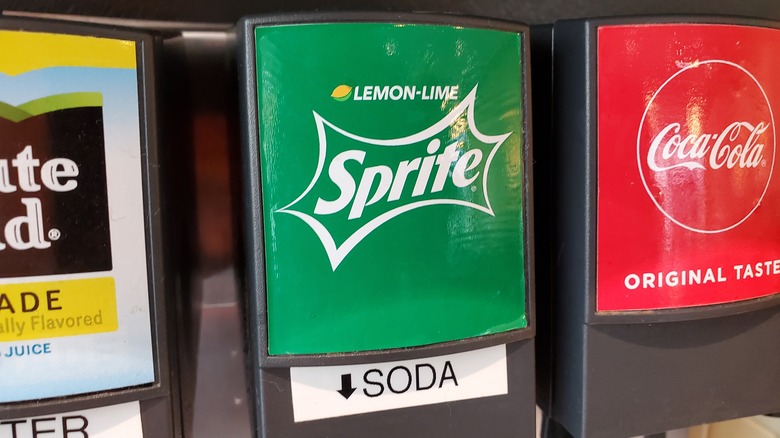Avoid Ordering These Items At Chain Sandwich Shops
In the world of fast food, sandwich shops are becoming an increasingly popular alternative to the typical drive-thru options and have continued to increase sales in recent years. Subway tops the sandwich list, coming in as the sixth most profitable chain in the United States overall, with about a dozen more sandwich chains ranking in the top 50, including Jimmy John's, Jersey Mike's, and Firehouse Subs.
With options ranging from bread to meat to sauces, there are endless combinations customers can create at any sandwich chain, be it a big national outfit or a hyper local shop. While sandwich shops may seem like a healthier alternative to fast food, there can be hidden sugar, calories, and additives lurking in your favorite order. Here's a look at 9 things to avoid ordering at sandwich chains.
Double meat
Meat is the cornerstone of many sandwich shops, but not all of it is created equally. A lot of sandwich shops use pre-packaged deli meat, which is processed to ensure its color and taste. According to the North American Meat Institute, the most common additives are sodium nitrate and lactic acid. Both alter the taste and stop the growth of potentially deadly botulism bacteria. But the nitrates used have been linked to certain kinds of cancer, according to the National Cancer Institute. One study by the International Agency for Research on Cancer specifically links processed meat to colon cancer. It's best to consume these pre-packaged meats in moderation, so doubling up on them on your next sandwich order may not be the healthiest option.
Another issue with these processed deli meats is they may not be what they're supposed to be. One Subway employee on Reddit claimed that the turkey is only 60% turkey, with chicken and turkey flavoring filling out the remaining 40%. Elsewhere on Reddit, a Which Wich worker claimed that the chain's "turkey, chicken, and ham are all that recompositioned meat like chicken McNuggets." This worker urged diners to get the Italian meats, claiming the "salty meats are always a safe bet."
White bread
When it comes to sandwich shops, bread choices can be as plentiful as topping choices. When deciding the base for your sandwich masterpiece, it might be best to skip the white bread, which is made from refined flour. This means manufacturers strip the grain of its bran and germ (and thus fiber, vitamins, and minerals) leaving the endosperm that helps the bread have a longer shelf life. This is helpful for stores because if bread lasts longer, they don't have to buy it as often, but the end result isn't as healthy and you're basically left with carbohydrates.
Carbs are an important part of your overall health as they provide energy and can help control weight, but only if chosen wisely and consumed in moderation. For instance, whole grain bread can be a better option than white bread because whole grains have more fiber and nutrients, like B vitamins. They also help the body absorb nutrients, like protein, fiber, and vitamin C. In addition, medical experts at the Mayo Clinic agree that a person should only consume about 225 to 325 grams of carbohydrates per day, so consider doing some research on the nutritional values of the bread at your favorite shop before you place your order.
Wheat bread
While whole grain bread is healthier than white bread, wheat bread presents its own set of issues. Some sandwich shops may not actually sell true wheat bread, either. For instance, in the words of one Reddit user regarding Subway's variety, "I don't know if this has been mentioned, but don't buy any variety of wheat bread at Subway. It's actually worse for you than getting the Italian. It's dyed... to make it look and taste different." A look at Subway's online ingredient list confirms this claim. The first ingredient listed for the "multigrain" bread is "enriched wheat flour." That same ingredient is the first one listed in Subway's white bread, as well. The confusion over this is one of the reasons some doctors avoid eating bread altogether.
As with white bread, enriched wheat flour is processed grains stripped of naturally-occurring nutrients. In this respect, the enriched whole wheat bread at Subway is interchangeable with white bread. Whole grains are essential to good health and have been linked to lower cholesterol and blood pressure, but to ensure you're getting the real deal, check the ingredient list. Nutritionists say the first ingredient should be "100% whole grain." Consumers should be skeptical of any food product that does not include the "100%." The absence of this means yes, the product is made with whole grains, but the amount can be minuscule and not provide much health benefit at all.
Meatball subs
If you're skipping deli meat, a meatball sub seems like a good option because it's hearty and full of protein. Before you order, though, take a peek at the meatballs and the sauce. Does the sauce look like it's been stirred recently, or has it just been sitting there for hours? Restaurants should have protocols in place to ensure meats are fresh, but some sub chain customers are questioning if all the stores adhere to those policies.
If you are really craving the meaty gooey goodness, one employee suggests asking for fresh meatballs from the back of the store. "Don't ever get the meatball sub unless you see the employee take it from the back," the poster warned on Reddit. "When it sits out all day it gets really gross, and they put it in the fridge at night and just reheat it at lunch the next day. I have had the responsibility of 'stirring the film off the top' on more than one occasion."
Sauces
Sauces are the spice of sandwiches; they dress up plain subs to give them entirely new flavors. But, do you know what's really in that sauce bottle?
First, be aware of the potential for germs, which can develop from poor cleaning practices. "NOT AT MY STORE, but I had an employee who came from a different franchised Subway, and he told me at his store they never washed sauce bottles, just refilled it with more sauce," claimed a Subway employee on Reddit. "Which is gross if you have weeks old mayo just stuck to the side of the bottle and you're putting new mayo inside. It grossed me out." In light of this revelation, perhaps ask for condiment packets rather than the "fresh" sauce options.
The extra calories and sugars hidden in seemingly small portions create another sneaky sauce situation. For instance, the chipotle mayo for a medium sub at Port of Subs has a whopping 380 calories and 42 grams of fat. Keep in mind that, according the Mayo Clinic, it's recommended the average person only consume between 44 and 78 grams of fat per day. Opting for a sauce that has fewer calories is a good option but keep the sugars in mind. A 2-ounce portion of the sriracha sauce from Port of Subs is only 59 calories but has 12 grams of sugar. At Subway, the sweet onion teriyaki sauce has 30 calories, but has 8 grams of sugar including 6 grams of added sugar. According to the American Heart Association, too much sugar in one's daily diet can lead to heart disease, cancer, and obesity.
Veggie options
If you are watching your calories and fat, or you just don't eat meat, then you may be tempted to order a vegetarian option at your local sandwich shop. While appearing to be among the healthiest items on any menu, it might actually be one of the worst. Take a look at The Veggie at Jimmy John's. It's made with provolone cheese, avocado spread, mayonnaise, lettuce, and cucumber. Get it on French bread and that "healthy" option can reach more than 1,000 calories and as many as 78 grams of fat. That calorie count is nearly half of what the average adult is supposed to consume all day, according to the U.S. Department of Health and Human Services. And the fat content is higher than the highest recommended amount of fat intake per day for the average person.
The same is true for the vegetarian sandwich at Port of Subs, which is made with three cheeses — provolone, Swiss, and smokey cheddar — and is one of the highest in calories at 670 for a medium sub. If you absolutely can't resist the vegetarian option, then try it as an "unwich," which replaces the bread with a lettuce wrap and skips the mayonnaise.
Tuna
Tuna is the protein of the sea. However, tuna at sandwich shops get a bad rap, and perhaps rightly so. Is that tuna sandwich really tuna? In 2021, there was a class-action lawsuit against Subway saying that the restaurant's claim of 100% tuna is false and misleading. Lab tests commissioned by The New York Times found virtually no detectable tuna DNA in the samples. Instead, the "tuna" had traces of pork and chicken. As the lawsuit continues (which is yet to be settled as of this writing), many sandwich lovers are hesitant to pick the tuna salad sub.
As for Subway, the restaurant chain adamantly denied the fake tuna claims, saying through a spokesperson that "the taste and quality of our tuna make it one of Subway's most popular products and these baseless accusations threaten to damage our franchisees." The chain even launched a website with proof its tuna is real.
Side items
"Would you like to make that a meal?" "Our cookies are buy two for $1 today!" These questions and statements lead to side items sneaking their way onto your plate and adding to the overall calorie content of the meal. Just adding a brownie at Jersey Mike's will tack on 500 calories and 28 grams of fat. A chocolate chunk cookie from Subway has 220 calories, 10 grams of fat, and 16 grams of sugar. Don't have a sweet tooth? The salty items are not much better. A package of Miss Vikki's Salt and Vinegar chips are 200 calories, have 11 grams of fat, and 23 grams of carbs. And the 5-Cheese Mac & Cheese from Firehouse Subs hass 380 calories, 20 grams of fat, and 33 grams of carbs.
While upgrading to a meal and adding a side item seems like an economical choice, it may not be the best for for your health. Healthier side options are available at most sandwich shops, for instance, Panera Bread offers apples, bananas, and a fruit cup among its side items.
Soda from the fountain
If you opt to upgrade your lone sandwich to a meal deal, it will most likely come with a drink. Some sandwich shop workers, however, have strong warnings about the soda fountain. One Jimmy John's employees took to Reddit to say, "I worked at a Jimmy John's for over a year. The ice machine was washed exactly once while I worked there, when the district manager discovered mold growing inside. The ice dispensers for the soda machines were never cleaned as far as I'm aware." Another poster who apparently worked at Silver Mine Subs, recalled, "I think the grossest/weirdest things were probably the ice machines (I always was extra careful to inspect the ice, before filling it, because I found quite a few frozen bugs in there)."
The bacteria issue inside soda fountains is a problem. A study published in the International Journal of Food Microbiology found varying amounts of coliform and bacteria present in 30 soda fountains. The amount found may not make you sick every time, but researchers told Food Safety News that it can still have negative health consequences. "Soda fountain beverages could be linked to gastrointestinal upset that could go unreported," researchers said. "It's simply that some bacteria may potentially cause some disease or gastroenteritis distress." Maybe opt for a bottled soda instead.
